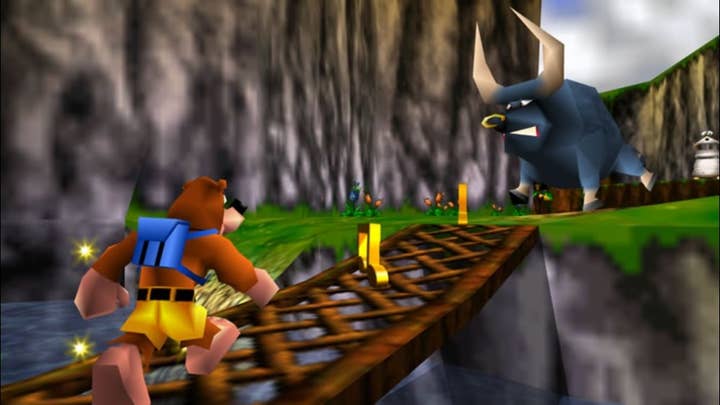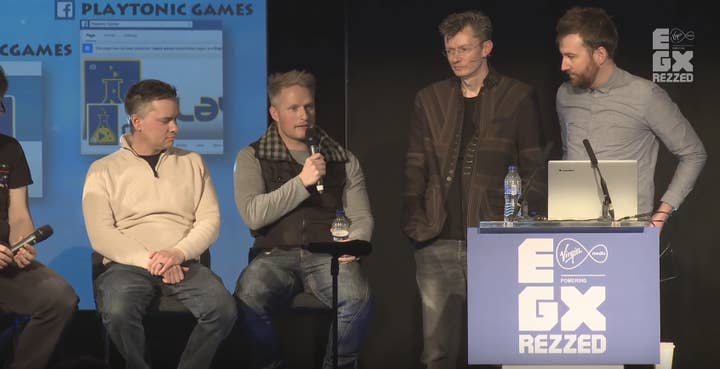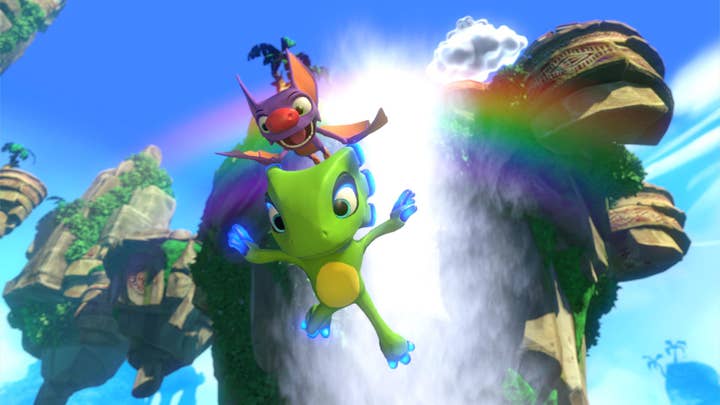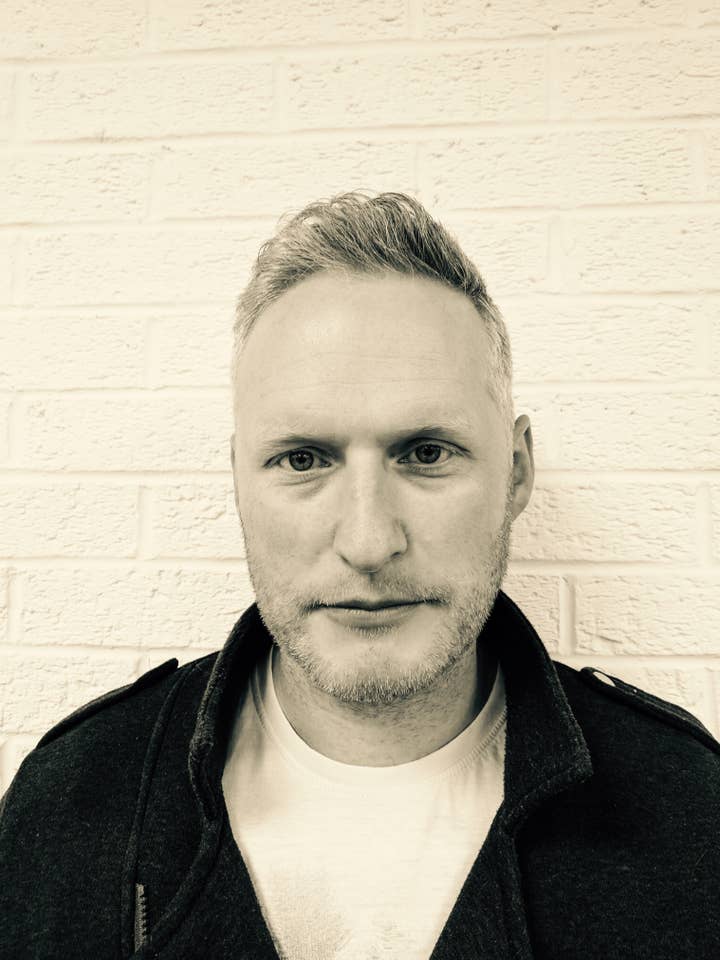Yooka-Laylee: The backers' view
We revisit Playtonic's dramatic two years and speak to the firm's Kickstarter supporters
For any nostalgic 30-something brought up on a gaming diet of N64 3D platformers, Yooka-Laylee was probably one of their most highly anticipated games of the year.
It's made by some of the creators of Banjo-Kazooie and Donkey Kong Country, who had reunited to return to the genre that made them famous. Gamers over a certain age rejoiced.
Back in May 2015, the team took the game to Kickstarter and set a rather conservative target of £175,000. It smashed that in just over 30 minutes. Stretch goal after stretch goal fell, former Rare composers and artists joined the project, new platforms were added, and by the time it all finished, the team was sitting on £2.09m.

"There's always a healthy bit of skepticism around Kickstarter campaigns, but, as the pedigree was already there for this team, it was something I was eager to support on day one," says Hyle Russell, a backer of Yooka-Laylee and one half of Rare fan website DK Vine.
Ben Etchells, another fan who had been following Playtonic since it was formed, adds: "As a massive Banjo-Kazooie fan I was ecstatic at the thought of the genre making a return, especially with the game being made by the very people that made the Banjo games. I wanted Banjo-Threeie more than anything so Yooka-Laylee was the next best thing."
The crowdfunding started in May, but like with any successful Kickstarter campaign, the story started a little earlier. The first hints of Yooka-Laylee were revealed in an interview for Edge magazine just after Christmas (the writer of the piece was so enthused by the developer's plans that he eventually joined the company). Then, in March, the Playtonic team - including studio head Gavin Price, artist Steve Mayles and programmer Chris Sutherland - took to the stage at EGX Rezzed to reveal Project Ukulele.
This was uncharted territory for the former Rare veterans. They were used to working for one of the world's most secretive developers, and now they were thrust (literally) centre stage.
"[The media attention] did surprise us," Price tells GamesIndustry.biz. "We had no expectations as we were all just looking forward to making our own games. Seeing the response from specialist press and fans was both heart-warming and validating at what was a very delicate time. It gave us an opportunity to listen to many opinions and hopes for what we'd go on to do, including a crowd-funding campaign. So from day one we've had the opportunity to align with fans and have their support to help shape our future."

At the start of development, Playtonic consisted of six former Rare employees. With the newfound media attention, they added a seventh in the form of ex-CVG editor Andy Robinson.
Robinson knew that the nostalgic pull of Rare would appeal to the specialist press. However, if he was going to keep them on-side he had to strike a balance between keeping the Kickstarter backers informed, whilst holding back enough in order to create that big media splash. That's why the studio went quiet for months, unsettling its supporters, before finally breaking cover in early 2016.
It was a potentially risky strategy, but it paid off. Although some backers were disappointed that they had to visit another website (or buy a magazine) for their big Yooka-Laylee update, the developer did attract a large amount of press coverage.
"The fact that Playtonic was courting the wider press with Yooka elevated it beyond a mere indie game," Russell continues. "To see a 'Rare' game on the cover of the UK's Official Playstation Magazine was an out-of-body experience. Playtonic may have made this for the hardcore Rare fans, but it was absolutely vital for them to not just preach to the choir."
"To see a 'Rare' game on the cover of the UK's Official Playstation Magazine was an out-of-body experience"
Hyle Russell, DK Vine
Price adds: "We found ourselves in a unique position of having to serve different audiences with information to keep everyone in the loop. Working with Team17 helped make the process easier. However, there was always an angle we had to cover around all messaging that ensured our backers felt like VIPs as they'd played such a huge part in helping us from the start."
The PR campaign certainly seemed to work, as did the studio's efforts to bring in new staff. The success of the Kickstarter meant that Yooka-Laylee was never going to be possible with just seven employees. Playtonic partnered with Team17 to help release the title onto other platforms, and then started rapidly adding names to its team. It now has 24 employees.
"We could have stayed small and taken a lot longer to create the game, but we felt growing a team with talent we knew would make us stronger on both Yooka-Laylee and games beyond," Price explains.
He continues: "We were in a unique position where we personally knew some ready-made talent. Without ever posting a job advert we received lots of emails from former friends and colleagues, which made the growth plan a lot easier and smoother to manage than a traditional hiring plan."
A lot of those hires came from Price's former home at Rare, a studio that is working on ambitious projects of its own. As a result, it's inevitable that there has been some tension between the two developers behind-the-scenes.
Yet regardless of what was said and done in the past (and we've heard plenty of stories), at EGX Rezzed last month, Rare boss Craig Duncan paid a visit to Playtonic's stand, met with Price and vowed to pick up his game at launch. It was a positive gesture that was followed by Rare's community team congratulating the studio on Yooka-Laylee's launch. A friendly relationship between these two developers is certainly something fans would want to see.

Although the media and recruitment efforts were coming along well, not everything was going to plan elsewhere. The Toy Box mode - effectively a pre-release demo promised to Kickstarter backers - took far longer than promised.
Fans were unhappy about that, but Playtonic encountered its first major backlash when it announced plans to drop the Wii U version of the game.
The Wii U edition was the most requested version from backers, and was the only console port being handled in-house. However, Wii U was approaching the end of its life, and technical support for Unity (the engine that Yooka-Laylee was built on) was beginning to dry up. Although Playtonic never blamed its partners, the studio had little choice but to halt production.
It offered refunds to disappointed backers and announced plans to make a Nintendo Switch version - but fans remained angry. That resentment has subsided slightly, although you'll still find an army of backers pestering Playtonic for that promised Switch edition.
"The community was mostly supportive and anyone affected by the decision we went out of our way to look after; Whether it was supplying a refund or helping them move to another platform, which was extra work that we were adamant about doing to show them the respect they deserved," says Price. "At the point in time we realised the game wasn't going to happen on the platform, internally we were all gutted as we knew it was a great fit for the console and audience. However, most came with us and supported our move on to Nintendo Switch and we're looking forward to our first Nintendo release in the near future."

Indeed, not every fan was critical of Playtonic. In fact, everyone we spoke to - although disappointed - was ultimately forgiving.
"Getting older has made me far less of a cynic when things go wrong," says Russell. "It's all part of life. As someone who initially went for the Wii U version, I was perfectly fine shifting it to my Xbox One. Playtonic has always been honest and upfront during the development, so I have no qualms with how anything was handled."
Manish Patel, another of the game's backers, tells us: "I was a bit upset about the Toy Box, but I got over it. I never backed the Wii U version but I'm happy it's coming to Switch."
Anthony Navarro, who was one of the game's first Kickstarter supporters, adds: "When it came to the Wii U removal, I could understand why people would be upset. It wasn't my platform of choice, but I know a lot of fans wanted to play it on a Nintendo console to keep that Rare tradition. Playtonic was really upfornt about it and offered refunds so I think they managed that situation fine."
The issues around Wii U wasn't the end of Playtonic's troubles. Another emerged in the form of one of the game's voice artists - the popular YouTuber JonTron [Jonathan Jafari]. He was included in the game due to his love of Banjo-Kazooie, but just as the game went gold and manufacturing began, Jafari caused an online media storm following a series of racist views. Playtonic felt it had no choice but to remove him from the game, and JonTron fans were quick to attack the studio for the decision.
"That was just dumb," says Navarro. "He was never promised in the Kickstarter, so I don't feel Playtonic did backers wrong. I can totally understand wanting to distance yourself from someone saying really stupid, racist garbage. It barely had an impact at all for me, but I'm glad they were honest about it."
Etchells, however, felt the studio shouldn't have got involved. "I didn't like how they handled it all. They should have stayed out of it and left the game as it was."
With one PR disaster just about averted, Playtonic soon found themselves in the news again - this time around Yooka-Laylee's eclectic review scores. The critics were torn over the quality of the title, with scores ranging from 2/10 to 10/10. Fans seemed happy with it, whereas everyone else wasn't quite so excited by the team's efforts.
"Of course, we take all constructive criticism from reviews on board, which is why we've already released a patch to further improve things like performance and polish, and we'll continue to do that"
Gavin Price, Playtonic
"The reviews seemed to confirm that we delivered what we promised to our fans," Price says. "It's difficult to please everybody all the time of course, but the comments we've seen - good and bad, and there were many really positive reviews from big outlets - suggest that fans of golden age 3D platformers will enjoy Yooka-Laylee a heck of a lot. Of course, we take all constructive criticism from reviews on board, which is why we've already released a patch to further improve things like performance and polish, and we'll continue to do that."
There were some 15,000 backers, and without speaking to all of them, it's not clear whether Playtonic really did satisfy the fans or not. Anecdotally, it seems to have pleased those who craved more Banjo-Kazooie and it certainly has a high Steam user rating.
"I've been having an absolute blast playing Yooka, and I don't regret the hundreds of dollars I poured into it," says Russell. "It's everything that was promised, the type of 3D platformer that we haven't really experienced since 2000. It also finally exonerates Rare from having to make a similar game, giving Sea of Thieves a bit more leeway with the stubborn old guard who couldn't accept that we never got Banjo-Threeie."
Patel has similar thoughts: "It's everything I wanted it to be. It's the Banjo feel with new characters and world. This is what was promised and they delivered. It could have done with a bit more polish but over-producing games can also take something away from them. I am really glad it exists."
Some backers were a little more critical, although even these were ultimately happy with the game they ended up with.
"I really do like the game and I think Playtonic delivered the '90s-style 3D platformer that they promised," says Navarro. "But I think there's quite a few bad decisions that feel ripped straight out of the worst parts of the old games.
"The actual platformer part of the game is done really well and is a lot better than the older games in my opinion. I think that's what has kept me playing."
Etchells continues: "I'll be the first to admit I have been very critical since receiving Yooka Laylee, which may be unfair considering the amount of work that was put in to it.
"The voices are annoying, the game is a little too hard to complete without help from a guide, and the arcade games are a bit cheap. These were all my initial thoughts, but I have since grown to accept these things and really enjoy the game. Is it as good as Banjo-Kazooie? No, but it's a good effort.
"Overall they did deliver and I will certainly be looking forward to their future projects."
Yooka-Laylee has been a challenging ride for the team at Playtonic. Whether it's managing backers, navigating PR disasters or building a development team, it's certainly been an education. And the game that came out the other end, although not perfect, seems to have kept the fans happy at least.
"We learned a massive amount about every possible angle of the industry, which was beyond our comfort zones as developers," Price concludes. "And it only makes us stronger and hungrier for long-term success. Yooka-Laylee has put us in an incredibly strong position for the future, not least because our group is now three times larger than when we started and it's stuffed full of talent. We can't wait to repay our fans with even more colourful and diverse adventures in the future."








